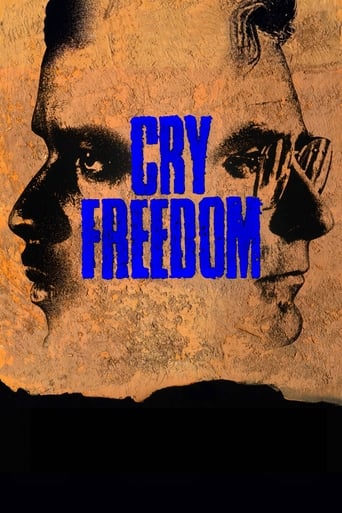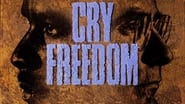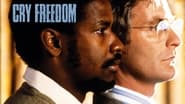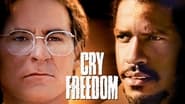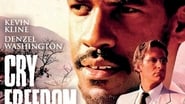GusF
Based on the books "Biko" and "Asking for Trouble" by its protagonist Donald Woods, this is an extremely good film which tells the story of the Daily Dispatch editor's friendship with the murdered Black Consciousness leader Steve Biko and their struggles against apartheid. Having previously taken on the British establishment in "Oh! What a Lovely War", "A Bridge Too Far" and "Gandhi", Richard Attenborough turned his attention to the far more pernicious and destructive South African establishment of the time. His direction is as assured as ever and the script by "Gandhi" screenwriter John Briley is strong but the film's second half is slightly lacking when compared to the first. While it is not the first film that I have seen dealing with apartheid, it is the first that was made while it still existed so that was very interesting. As far as I am aware, the film is very historically accurate, which I appreciated.Kevin Kline is extremely strong as Donald Woods, a liberal South African journalist who comes to Biko's attention when he accuses the Black Consciousness Movement of advocating racism. After meeting him, however, he comes to appreciate that Biko is advocating equality and, contrary to the fears of many conservative Afrikaners, has no desire to create a system in which blacks would oppress whites in the same manner as they are themselves oppressed. Like Gandhi and Martin Luther King, he advocates non-violence to achieve his political aims. Woods, who served as an adviser on the film, learns over the course of the film that the regime is even worse than he thought. After Biko is murdered, he is determined that justice be done, something which leads him to be banned and essentially placed under house arrest. The final straw comes when the Security Police sends his children T-Shirts laced with acid. He decides to leave South Africa for his and his family's safety. After 15 years, Woods returned home in 1994 to vote in the first democratic election. He died in 2001.In one of his first major film appearances, Denzel Washington is fantastic as Steve Biko, a performance which deservedly earned him a Best Supporting Actor nomination. Biko is a highly intelligent, principled and courageous man whose fierce intelligence is underestimated by the regime because of the colour of his skin. He has a perfectly logical and reasoned answer to every question whether in conversation or in court and there is nothing that he says in the film that I found any reason to disagree with even slightly. One of the best illustrations of this is when he says that a black child is doomed in live in the shanty towns on the outskirts of society irrespective of how intelligent he or she is whereas white children have considerably more opportunities. Biko is murdered about 80 minutes into the film and it is never as strong after his death. I think that it could have been better structured and included more scenes of him before he had to be killed.As is typical of Attenborough's films, the film has a very strong supporting cast, most notably Penelope Wilton as Woods' wife Wendy (though she does not have a South African accent) and Josette Simon as Dr. Mamphela Ramphele. However, I was slightly disappointed that Mamphela did not have a bigger role in the film as she seemed to be introduced with much fanfare and then simply disappeared soon after Biko's death. In real life, she was having an affair with Biko and had two children with him and a third on the way when he died but this is left out of the film, which is a shame as he could have made for an interesting subplot. As with the two "Roots" miniseries, I thought that it was a great idea to cast well known white actors with generally likable screen personas in antagonistic roles such as John Thaw as the Minister of Justice Jimmy Kruger (who died only six months before the film was released), Timothy West as Captain de Wet and Ian Richardson as the State Prosecutor. Conversely, Julian Glover is cast against his usual villainous type as Woods' friend Don Card. The film also features great appearances from Zakes Mokae (who has the largest role of any actual South African), Kevin McNally, Kate Hardie, Alec McCowen, Louis Mahoney, Joseph Marcell and Attenborough's brother-in-law Gerald Sim as the police doctor who examines the dying Biko. One actor whom I thought was conspicuous by his absence was the prominent anti-apartheid activist and playwright Athol Fugard, who previously played General Smuts in "Gandhi".At more than two and a half hours, the film is a tad too long and it focuses too much on the Woods family's escape from South Africa. While an accurate depiction of their escape and good scenes in their own right, they could have easily been shortened. After a while, it began to feel more like an adventure film and this did not fit terribly well with the rest of the film. There were also not enough scenes of the regime discriminating against black South Africans in the second half (in stark contrast to the first) for my liking. Given the time, the film was shot in Zimbabwe rather than South Africa itself and Attenborough made excellent use of that country's scenery. The Soweto massacre is depicted in flashback towards the end of the film but I felt that it would have been better to place it in its proper place chronologically speaking and to give it more prominence as the scene could have been as effective and moving as the depiction of the similar Amritsar massacre in "Gandhi".Overall, this is a very entertaining and thought provoking film but it is never as engrossing as it should be after Biko's death. It is a powerful statement against racism but it could have been even more so with slightly sharper writing.
fezziwig2084
This movie was very interesting especially, since I don't know anything about South Africa and important events that have occurred there. It stars Kevin Kline as Donald Woods who is an editor for a liberal newspaper and hears how black activists have been causing trouble for the apartheid government. One activist, Steve Biko, who Woods disagrees with because he wishes for black South Africans to separate themselves from white South Africans ways of thinking and start thinking for themselves. Woods eventually change his opinion about Biko and once Biko shows Woods how blacks were oppressed in South Africa wants to support him. This becomes even more true when Biko is thrown in prison and tortured to death.Woods finds out what happened to Biko in prison and that the apartheid covered up how he died. Woods is determined to tell the true story even though he is being threatened by the apartheid.The direction and characterization was great especially Denzel Washington as Steve Biko. The style of the film was interesting as it was told in a documentary style, which some people might find the pacing too slow. The scenes where the activists and the protesters are shot by the National Party in South Africa are more disturbing than most movies because it shows whats happening without any cutting and in a documentary style. This is a great movie to watch for people who like watching important historical movies about a few amazing people.
namashi_1
Richard Attenborough is one storyteller. 'Gandhi' & 'Chaplin' are widely regarded & respected to this date. 'Cry Freedom', according to me, is his finest work since 'Gandhi'. This British drama takes place in a time of violence, and is executed with flourish. Even the performances are top-notch! 'Cry Freedom' is set in the late 1970s, during the apartheid era of South Africa and centers around the real-life events involving black activist Steve Biko and his friend Donald Woods, who initially finds him destructive, and attempts to understand his way of life.'Cry Freedom' delves into the ideas of discrimination, political corruption, and the repercussions of violence. Based on a pair of books by journalist Donald Woods, this human-tragedy is wonderfully written by John Briley. Also, the dialogue at places, give you goose-flesh. Sure, the writing does drag a bit, but that doesn't effect it's impact.Richard Attenborough knows what he's making. He knows this isn't an easy story to make. But, the veteran directs each frame with flourish. Cinematography by Ronnie Taylor, is excellent. Editing & Art Design, are perfect.Performance-Wise: Denzel Washington is fantastic as Steve Biko. He delivers a performance that easily ranks amongst his finest works to date. Kevin Kline as Donald Woods, on the other-hand, is restrained all through. Not once does he go over the top. Penelope Wilton is effective. Kevin McNally scores. Others lend good support.On the whole, 'Cry Freedom' is a terrific film, that over-shadows it's flaws, cleverly. Don't miss this one!
Dr Jacques COULARDEAU
A long film about a very important character from South Africa, Stephen Biko. He is one of these Blacks who did not survive apartheid, who actually died a long time before their normal time. The already old film though does not show how important Biko was, what he really represented. His life and his teaching is reduced to little, at best a few witty remarks. The film being from 1987, the objective was to push South Africa over the brink that would lead her to liberation. So the film aims at showing how irrational the South African supporters of apartheid are, in 1987. To show this the film has to look beyond Biko's death, hence to center its discourse not on Biko but on a white liberal journalist and his escaping the absurd system in which he is living. His escape is made necessary because of the victimization he is the victim of, along with his family, and because he wants to publish the first book on Biko, after his death, and that can only happen in England. The film shows a way to escape South Africa, while apartheid is still standing and killing. So do not expect this way to be realistic and true. It could not be. But the film has tremendously aged because it does not show South Africa with any historical distantiation, the very distantiation that has taken place under Nelson Mandela's presidency and that is called forgiveness provided those who want to be forgiven speak up and out. The film is strong and emotional but that very historical limit makes it rather weak today, especially since the film does not mention the third racial community, the Indians. Panegyric books or films all have that defect: they are looking at the person they are supposed to portrait from only one point of view. That explains why the film has aged so much, seems to be coming from so long ago, as if nothing had changed at all. A remake is necessary.Dr Jacques COULARDEAU, University Paris 1 Pantheon Sorbonne, University Versailles Saint Quentin en Yvelines, CEGID
